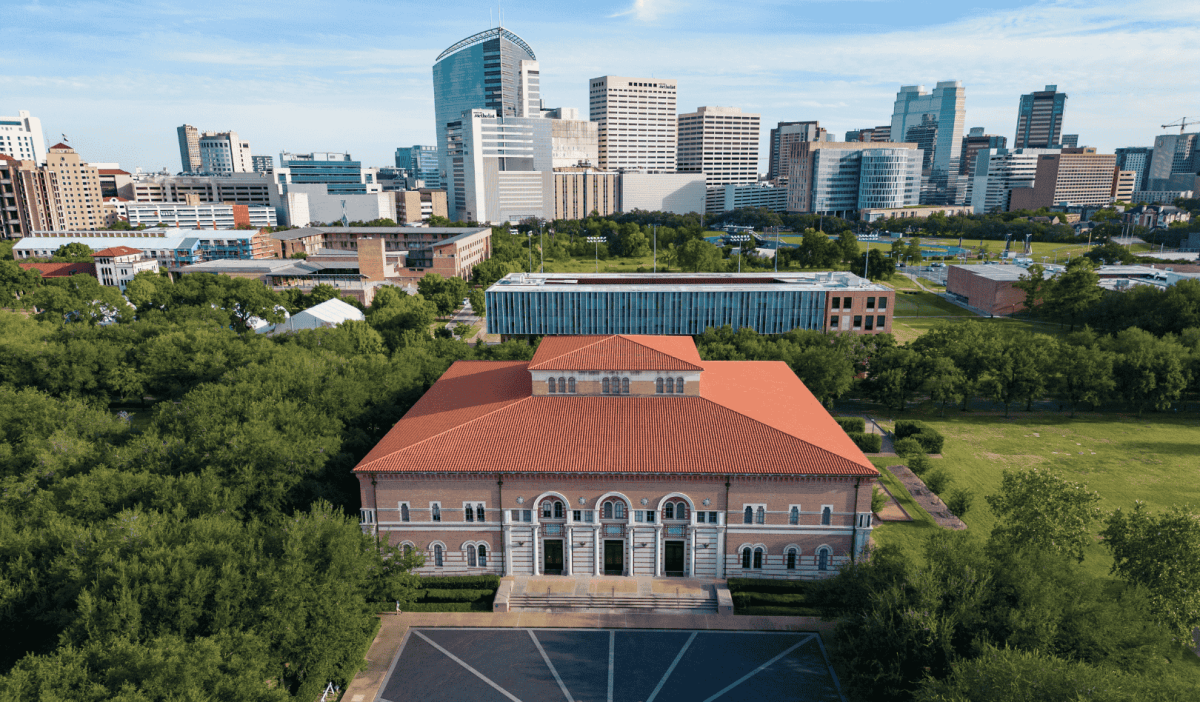Last academic year, Rice’s Master of Energy Economics (MEECON) program celebrated its 10th anniversary. The program, known for equipping graduates with highly sought-after skills in the energy industry, is the product of a natural collaboration between the School of Social Sciences’ economics department and the Baker Institute for Public Policy.
Co-directors Peter Hartley, George A. Peterkin Professor of Economics, and Kenneth Medlock, James A. Baker, III, and Susan G. Baker Fellow in Energy and Resource Economics and senior director of the Center for Energy Studies, have been involved with the MEECON program since its inception. Hartley primarily focuses on internal aspects of the program, such as curriculum development and graduation approvals, whereas Medlock mainly focuses on external relations with potential employers and prospective students, networking opportunities, and events programming with the Baker Institute. Hartley and Medlock work together to select students from a competitive pool of applicants for the MEECON program.
“I tell incoming students that it's like drinking water from a firehose,” said Medlock. “They complete 40 hours of coursework in one year, so they need to be technically situated to succeed in the program.”
Beginning in the first semester, “MEECON students take basic foundational courses in economics and statistics,” said Hartley. “The courses progress from foundational instruction to more applied learning – for example, the MEECON practicum – which enables students to make external connections in the industry.”
The co-directors aim to build cohorts of students with diverse backgrounds and professional experiences.
“Everybody views the world from where they sit, and placing them in an environment – a cohort – where they can learn from each other, is incredibly valuable,” Medlock said. “This then translates when they're interviewing, because they can express a much broader appreciation of the energy landscape, which has been successful for all of them.”
The diverse cohorts give rise to a range of goals that the students have upon graduation.
“We have a number of students who utilize their MEECON degree to change their career path, and some of them have changed quite a bit,” said Hartley. “On the other hand, MEECON students who remain with their previous employers have reported substantial promotions and changes in their job functions.”

Part of what makes the MEECON a standout program is its focus on providing students with real-world experiences that set them up for success in their professional careers, such as involving them in international conferences like CERAWeek, the Offshore Technology Conference, and GasTech. In addition to learning more about the industry, events like these provide students with exceptional networking opportunities. Another benefit to attending these conferences is access to internal programs for future leaders. These programs were the inspiration for the Future Leaders Program run by the Baker Institute’s Center for Energy Studies, which began last spring and consists of six lunch meetings per year.
“The Future Leaders Program is something we have created for graduate students who are engaged in energy-related discourse and programming across the Rice University campus,” said Medlock. “We bring in external corporate leaders to discuss their career paths, which gives students – including MEECON students – an opportunity to engage with them, ask questions, and learn more about what it takes to be successful in this industry.”
The networking aspect of the Future Leaders Program is intended to give students the ability to expand their engagement beyond campus, providing them with a platform to grow and succeed as they step into their careers. Because Rice graduate students from multiple disciplines are invited to the lunches, MEECON students also have the opportunity to build a network across campus, engaging with students involved in other aspects of energy research. Other programs involved in the Future Leaders lunches include the Master of Global Affairs, Master of Energy Transitions and Sustainability, and Master of Engineering Management and Leadership.

The experiential nature of the Future Leaders Program has a natural synergy with the MEECON curriculum. Beyond the Future Leaders Program, the Baker Institute has additional ties to the MEECON program, including faculty members who are Baker Fellows and Ph.D. teaching assistants supported by the Baker Institute.
“The Center for Energy Studies in the Baker Institute has incredibly deep roots in economics,” said Medlock. “Everything we do is linked to fundamental analysis, connecting that with data. It's one thing to understand theory, but application of theory really matters, particularly in understanding where the commercial intersections across the energy landscape are in the policy realm. There's a long historical tie.”
The Master of Energy Economics (MEECON) is a 12-month, full-time professional master’s program designed to educate future leaders and strategic thinkers in the energy sector. Students develop skills to provide insightful analysis of energy markets in order to inform future market orientation, capital asset decisions and firm strategic direction. Built upon programs in the Economics Department and the Baker Institute’s Center for Energy Studies (CES), the Master of Energy Economics provides a new avenue for energy professionals to develop human capital relevant for business development and/or strategic planning roles.
Photos: Brandon Martin, Lexi Phillips

